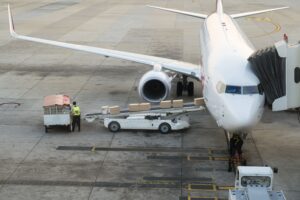Mar 11, 2024

The word ‘sustainably’ may have different meanings in different situations. However, the buzz word that is making rounds for more than a decade is ‘Environmental Sustainability’ – the ability to keep the environment clean, secured and functional indefinitely through minimisng environmental degradation.
Major contributor
Among the various sectors, aviation is seen as quite hyperactive, wherein everyone across the board talks about their initiatives in ensuring environmental sustainability.
Aviation leads the way
Aircraft manufacturers state that their aircraft are getting lighter and lighter, whereas the engine manufacturers claim that their engines are not fuel guzzlers but just sippers.
Fuel suppliers are coming up with sustainable aviation fuel (SAF) that is considered to be the industry’s biggest initiative for net-zero carbon emissions goals.
Aerodrome operators insist on electric vehicles in operational areas. Airports like Cochin International Airport in India (CIAL) – a fully solar powered airport not only generates its own green energy for its airport operation but also gives the surplus to the national grid. Other green and brown field airports are following suit.
Airlines who consider themselves as saviours of the environment are making their aircraft painting lighter, while some have even removed the upholstery. Almost all reduced the items in the galley, the meal tray and the number of services.
No one should get surprised, if one day, an airline announces a garden on the wings of its aircraft in an attempt to neutralise the carbon emissions!
READ: Airfreight industry’s sustainable stance
Geopolitical hurdle
While some initiatives are doing good, some appear to be a hype. Every individual, industry, organisation and country look for – what is in it for them? If an initiative is considered to be challenging their current position and existence then it becomes a geopolitical issue and air cargo is not an exception.
Air cargo and sustainability
While cargo terminals and equipment are operated with green energy, a business practice that is termed as a marketing strategy is virtually working against the zero-carbon emission principle.
Today the countries without any recognisable home markets of air cargo have a large fleet that offers belly as well as freighter capacity across the globe. Their business model is totally dependent upon sixth freedom traffic of carrying cargo from one foreign country to another foreign country through its own country hub.
It should be welcomed since they are in a position to offer the much-needed capacity and carry the goods at a price that the customer is willing to pay. Moreover, those airlines don’t have much to take under third freedom for the cargo originating from that country.
However, when they do long back-haul carriage, it is more of a deadload that is burning millions of gallons of fuel and leaving tons of carbon footprint which is certainly a matter of concern.
READ: Shining a light on the sector
Core contributor
For example, if a Middle East airline carries cargo from India to Europe through their own hub or when a Far East airline carries cargo from India to West Coast of US through their station, it is perfectly acceptable since the carriage follows the route.
But when taking advantage of sixth freedom traffic rights and principle of rating and routing of cargo don’t go hand-in-hand and resort to back-haul, it makes things worse.
For example, if a Middle East airline carries cargo from India to Australia or when a Far East airline carries cargo from India to Europe through their hubs, it is carriage of dead load for thousands of kilometres of back-haul and challenges the zero emission goals that the industry is regularly talking about.
Way forward
No airline would self-regulate and not accept back-haul deadload in the interest of environmental sustainability. Countries need to adopt regulations to discourage such carriage by extending the carbon footprint taxation regime that discourages carriage of back-haul dead load.
The post Back-haul dead load appeared first on AIR CARGO WEEK.
Go to Source
Author: Govindarajan Bashyam




